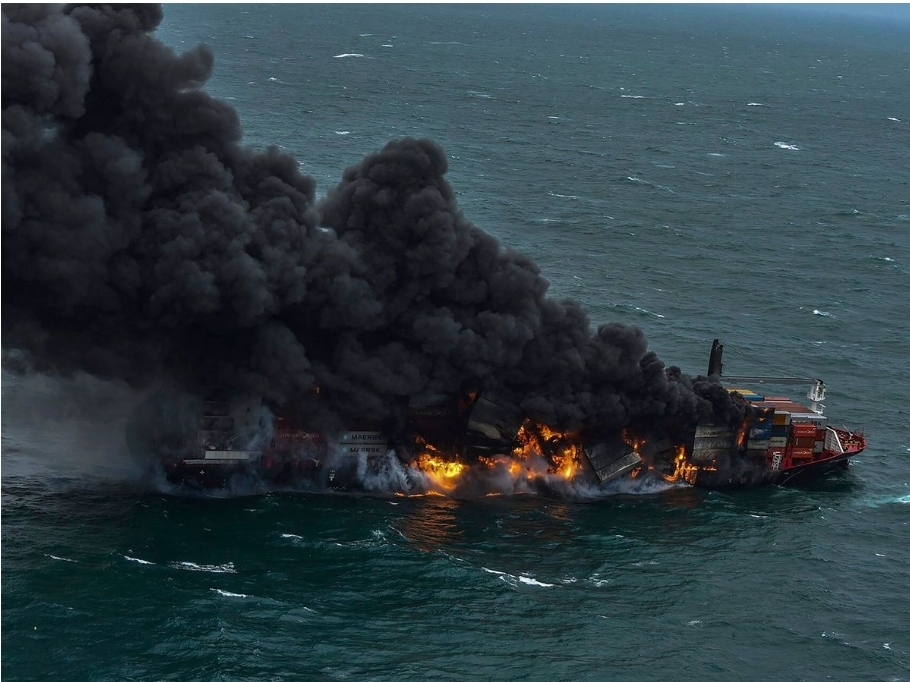
X- Press Pearl Fire – Has the Polluter Paid Sri Lanka yet?
By Lakmali Manamperi

The X-Press Pearl fire; the worst-ever marine disaster to occur in Sri Lanka’s territorial waters is being swept under the carpet with the rise of the health emergency in the country.
Environmental rights activists have consistently shed light on the issue to seek compensation for the damage X-Press Pearl caused to the country’s ecological balance. Calls have mounted to expedite the investigations, produce the necessary documents to avoid any delay to avoid defeated justice so victim communities don’t bear the burden of not upholding the Polluter Pays Principle (PPP).
The X-Press Pearl, a Singapore-registered cargo ship carrying chemicals and plastic pellets was burning off Sri Lanka’s western coast for nearly two weeks before it sank in June 2021. The hazardous goods, chemicals and oil released into the water have destroyed ecological systems, marine lives and their breeding grounds. It has contaminated water, caused coastal pollution, affected weather cycles and caused dogmatic impact on the fisheries and tourism sectors. Livelihood was impacted as fishing was prohibited in the immediate aftermath. A fear-induced drop in seafood consumption made matter worse. Foreshore is always of attraction for many seeking mental and physical relaxations. This too became an obstacle with access restrictions in certain coastal areas.
This depicts direct or indirect subjugation of human rights. Especially, the right to a clean and healthy environment, the right to an adequate standard of living, the right to enjoyment of favorable conditions of work, the right to food, the right to freely pursue one’s economic and social development, the right to water, the right to access natural resources, the right to physical health and the right to the continuous improvement of living conditions.
The incident is a long running disaster and reiterates the interrelation, interdependence and mutually responsive nature of environment and human rights. Justice C. G. Weeramantry in his book titled Tread Lightly on the Earth (2009) emphasizes the ancient native Australian wisdom which links every human being by an umbilical cord to Mother Earth. It stated; if Mother earth prospered, the community prospered, but if Mother earth was sick and afflicted, the community would wither perish. It accentuates the damage to the environment can impair and undermine all human rights spoken in the Universal Declaration and other human rights instruments. Therefore, it is the utmost duty of the polluter to rectify the damage caused to the environment by his actions or inactions and to help revamp the conditions of the victims whose rights the polluter violated in the process.
This analysis underpins the established environmental Principle – the Polluter Pays.’’ (PPP). This was developed in the 1920s as an economic principle in environmental management and was intended to resolve issues of improper allocation of costs resulting from environmental pollution. An improper allocation of costs arises when polluters escape liability and passes on the cost burden to communities which had no role in causing the pollution. Known also as externalizing the pollution the general community bears the burden by paying the price of reduced environmental quality or increased taxation which aims to mitigate the environmentally degrading effects caused by the polluter. The PPP holds polluters responsible for the environmental degradation and pollution by getting them to compensate to repair the harm they cause. The European Council identifies three classes of polluters.
(a) a person who directly damages the environment;
(b) a person who indirectly damages the environment; and
(c) a person who creates a condition leading to such damage.
To achieve the above desired goals, the PPP is embodied in major environmental regulations, statutes and instruments.
India’s judicially recognizes the PPP. The Sri Lankan Courts extensively discussed this principle in the famous Eppawela Case where it reiterated the importance of internalizing pollution to ensure polluters are held accountable to restore environmental pollution as well as to compensate the victims. The Sri Lankan Constitution does not embrace the fundamental right to a safe and healthy environment and hence the lacuna is successfully filled by creative and wide interpretation of other articles through judicial activism. Article 12 (1) of Constitution which states that ‘all persons are equal before the law and entitled to equal protection of the law’ is the provision frequently subjected to wide interpretations for environment related issues either on its own or in conjunction with other rights and fundamental duties provided under Article 28 (f) and Article 27 (14). The essence of Article 12 (1) depicts that the failure to apply environmental laws of the country to a particular project or a particular geographical area would amount to an unequal treatment of persons affected, or a violation of right to equal protection of the law.
The X Press Pearl fire contributed to an unequal situation in Sri Lanka where certain social sectors were economically deprived and people from certain areas were placed at a significant disadvantage compared to residents elsewhere in the country. The negligence of the polluter has indirectly damaged the environment. The full damages resulting from the accident is still being assessed. Local media reported that the government of Sri Lanka has sent an interim claim to the operator of the burnt-out container ship, requesting $40 million for response costs accrued through June 1 – the day before the vessel partially sank off Colombo. However, the procedure to fully rectify the damage has had significantly slow progress, pushing Sri Lanka to the brink of being deprived justice.
(The Writer is an Alumna of the Open University of Sri Lanka and holds a Masters Degree in Law from University of Lucknow, India. Her research interests are in the areas of Environmental law, Constitutional Law and Human Rights. She is reachable via [email protected].)
***************
Disclaimer – Factum is a Sri Lanka based think-tank providing international relations analysis and public diplomacy consultancies in Sri Lanka and Asia. Visit – www.Factum.LK
Factum Perspective : Why are foreign exchange reserves important for an economy?